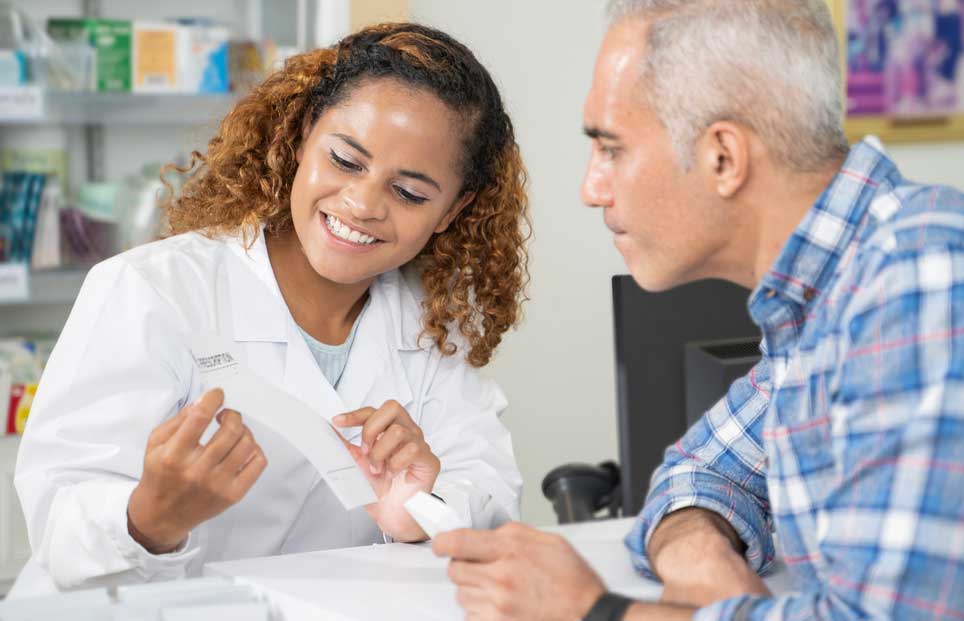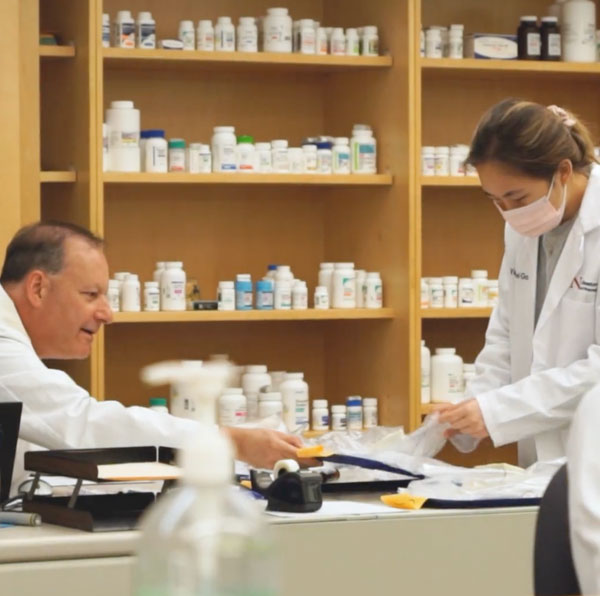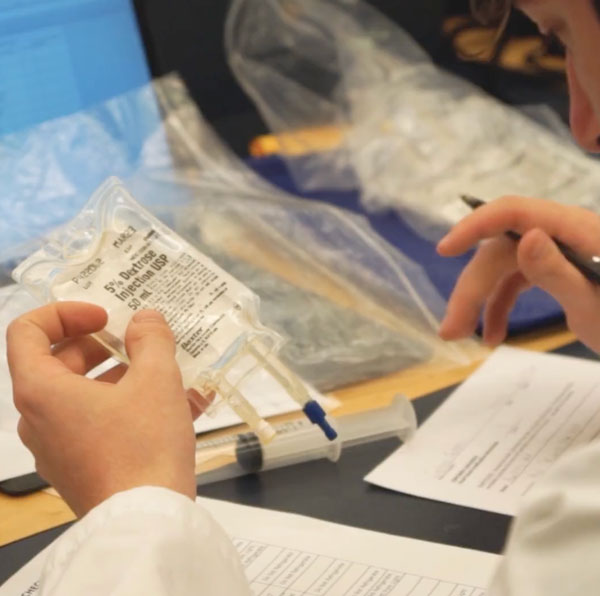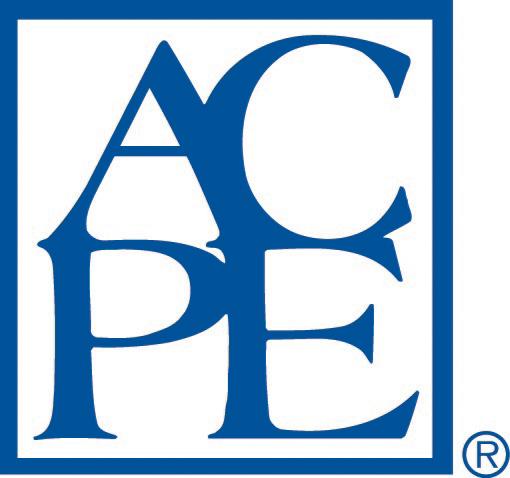
YOU ARE BOUVÉ

The Department of Pharmacy and Health System Sciences is an academic unit within the School of Pharmacy and Pharmaceutical Sciences at Northeastern’s Bouvé College of Health Sciences.
The faculty members who make up the department are a diverse group of professionals, including clinical pharmacists who practice in hospitals, ambulatory care clinics and community pharmacies, clinical scientists who conduct research in both laboratory and patient care settings, and social and administrative scientists who research a variety of aspects of medication use and health care delivery.



Dr. Lancaster is currently a Clinical Professor, and Chair in the Department of Pharmacy Practice and Health Systems Science at Northeastern University in Boston, Massachusetts. Previously, he served as a Clinical Pharmacy Specialist Internal Medicine at the Beth Israel Lahey Health – Lahey Hospital & Medical Center in Burlington, Massachusetts.
Faculty Spotlight
Upon completion of the program, students will be able to:
1.1. Learner (Learner)
Develop, integrate, and apply knowledge from the foundational sciences (i.e., pharmaceutical, social/behavioral/administrative, and clinical sciences) to evaluate the scientific literature, explain drug action, solve therapeutic problems, and advance population health and patient— centered care.
2.1. Patient-centered care (Caregiver)
Provide patient—centered care as the medication expert (collect and interpret evidence, prioritize, formulate assessments and recommendations, implement, monitor and adjust plans, and document activities).
2.2. Medication use systems management (Manager)
Manage patient healthcare needs using human, financial, technological, and physical resources to optimize the safety and efficacy of medication use systems.
2.3. Health and wellness (Promoter)
Design prevention, intervention, and educational strategies for individuals and communities to manage chronic disease and improve health and wellness.
2.4. Population—based care (Provider)
Describe how population—based care influences patient— centered care and influences the development of practice guidelines and evidence—based best practices.
3.1. Problem Solving (Problem Solver)
Identify problems; explore and prioritize potential strategies; and design, implement, and evaluate a viable solution.
3.2. Educator (Educator)
Educate all audiences by determining the most effective and enduring ways to impart information and assess understanding.
3.3. Patient Advocacy (Advocate)
Assure that patients’ best interests are represented.
3.4. Interprofessional collaboration (Collaborator)
Actively participate and engage as a healthcare team member by demonstrating mutual respect, understanding, and values to meet patient care needs.
3.5. Cultural Sensitivity (Includer)
Recognize social determinants of health to diminish disparities and inequities in access to quality care.
3.6. Communication (Communicator)
Effectively communicate verbally and nonverbally when interacting with an individual, group, or organization.
4.1. Self—awareness (Self—aware)
Examine and reflect on personal knowledge, skills, abilities, beliefs, biases, motivation, and emotions that could enhance or limit personal and professional growth.
4.2. Leadership (Leader)
Demonstrate responsibility for creating and achieving shared goals, regardless of position.
4.3. Innovation and Entrepreneurship (Innovator)
Engage in innovative activities by using creative thinking to envision better ways of accomplishing professional goals.
4.4. Professionalism (Professional)
Exhibit behaviors and values that are consistent with the trust given to the profession by patients, other healthcare providers, and society.
† Adopted from Medina M, Plaza CM, Stowe CD, et al. Center for the Advancement of Pharmacy Education 2013 Educational Outcomes. Am J Pharm Ed. 2013;77(8):162.
Approved, 2013
The Doctor of Pharmacy (PharmD) program at Northeastern University School of Pharmacy is fully accredited by the Accreditation Council for Pharmacy Education (ACPE) through June 30, 2026.
The Accreditation Council for Pharmacy Education (ACPE) is the national agency for the accreditation of professional degree programs in pharmacy and providers of continuing pharmacy education. ACPE (until 2003 known as the American Council on Pharmaceutical Education) was established in 1932 for the accreditation of professional degree programs in pharmacy, and in 1975 its scope was broadened to include accreditation of providers of continuing pharmacy education.
The mission of ACPE is to assure and advance quality in pharmacy education. ACPE is an autonomous and independent agency whose Board of Directors is appointed by the American Association of Colleges of Pharmacy (AACP), the American Pharmacists Association (APhA), the National Association of Boards of Pharmacy (NABP) (three appointments each), and the American Council on Education (one appointment). Since the inception of its accreditation agency recognition program in 1952, ACPE has been recognized continuously by the U.S. Department of Education, and it gained recognition by the Council for Higher Education Accreditation in April 2004. State boards of pharmacy require that licensure applicants from the United States have graduated from an accredited pharmacy degree program to be eligible to sit for the North American Pharmacist Licensure ExaminationTM (NAPLEX®).

The Accreditation Council for Pharmacy Education (ACPE), the pharmacy school accreditation agency, is required by the U.S. Department of Education to assure that pharmacy programs have a policy to record and address student complaints regarding a school’s adherence to the ACPE Accreditation Standards and Guidelines for the Professional Program in Pharmacy Leading to the Doctor of Pharmacy Degree hereinafter referred to as the “ACPE Standards”.
The purpose of this policy is to provide the opportunity for pharmacy students to document complaints about the School’s adherence to any of the ACPE Standards. Complaints may relate to matters involving the curriculum, faculty, student affairs or other areas relating to specific ACPE standards. In the case of common academic matters within the School (e.g., grade challenges, academic standing reviews and appeals, etc.), students should refer to policies of procedures of the school and college, as outlined in the Undergraduate Student Information Manual, and the Graduate Student Information Manual.
617-373-5226
[email protected]
Administrative Offices Located at 140 Fenway
Mailing Address
Northeastern University School of Pharmacy and Pharmaceutical Sciences
360 Huntington Avenue, R218 TF
Boston, MA 02115
Office of the Dean
Tel: 617-373-5209
[email protected]